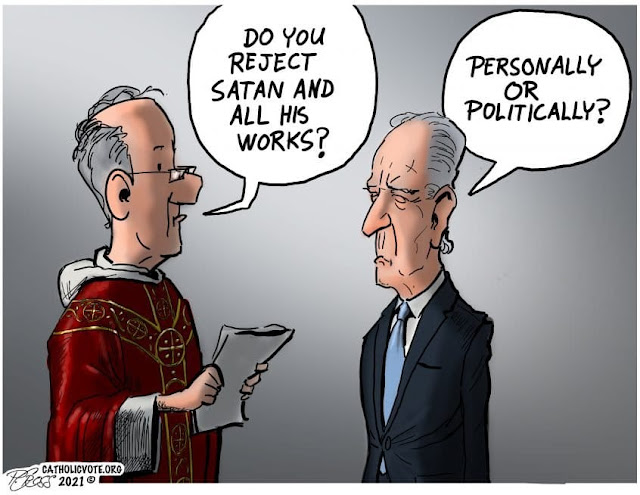Can't have it both ways.

The Catholic Way
Catholics in public life, these days those who drift left, routinely risk having their convictions challenged because they habitually want their cake (power) and eat it (enjoy it, exploit it, be corrupted by it,...) too. Pat Cross' cartoon exposes the cognitive dissonance entertained by such misguided souls.
It's one thing to be a Catholic who repents of his or her sins (and confesses those sins in the confessional) and resolves to avoid near occasions of sin. It is quite another to obstinately refuse to acknowledge and repent of those very public sins as such - e.g., support for the destruction of innocent pre-born human lives - and pretend that, at the end of the day, one's conscience is free of culpability after either standing idly by or by enacting laws and policies that permit a most heinous act against innocent pre-born human life.
A straight forward review of the terms to which Catholics are bound - if they truly love the Lord - reveal the standard, like the Nicene or Athanasian creeds, to which the Catholic heart and head must conform if, indeed, a Catholic wants to be identified as (a) Catholic.
- - -
Catechism of the Catholic Church | 2319 Every human life, from the moment of conception until death, is sacred because the human person has been willed for its own sake in the image and likeness of the living and holy God.
Canon 750 § 1. Those things are to be believed by divine and catholic faith which are contained in the word of God as it has been written or handed down by tradition, that is, in the single deposit of faith entrusted to the Church, and which are at the same time proposed as divinely revealed either by the solemn Magisterium of the Church, or by its ordinary and universal Magisterium, which in fact is manifested by the common adherence of Christ’s faithful under the guidance of the sacred Magisterium. All are therefore bound to avoid any contrary doctrines.
§ 2. Furthermore, each and everything set forth definitively by the Magisterium of the Church regarding teaching on faith and morals must be firmly accepted and held; namely, those things required for the holy keeping and faithful exposition of the deposit of faith; therefore, anyone who rejects propositions which are to be held definitively sets himself against the teaching of the Catholic Church.
Code of Canons of the Eastern Churches
Canon 1436 – § 1. Whoever denies a truth which must be believed with divine and catholic faith, or who calls into doubt, or who totally repudiates the Christian faith, and does not retract after having been legitimately warned, is to be punished as a heretic or an apostate with a major excommunication; a cleric moreover can be punished with other penalties, not excluding deposition.
§ 2. In addition to these cases, whoever obstinately rejects a teaching that the Roman Pontiff or the College of Bishops, exercising the authentic Magisterium, have set forth to be held definitively, or who affirms what they have condemned as erroneous, and does not retract after having been legitimately warned, is to be punished with an appropriate penalty.


.png)



Comments
Post a Comment
Your comments will be appreciated and posted if 1) they are on topic and 2) preserve decorum.
Stand by your word.